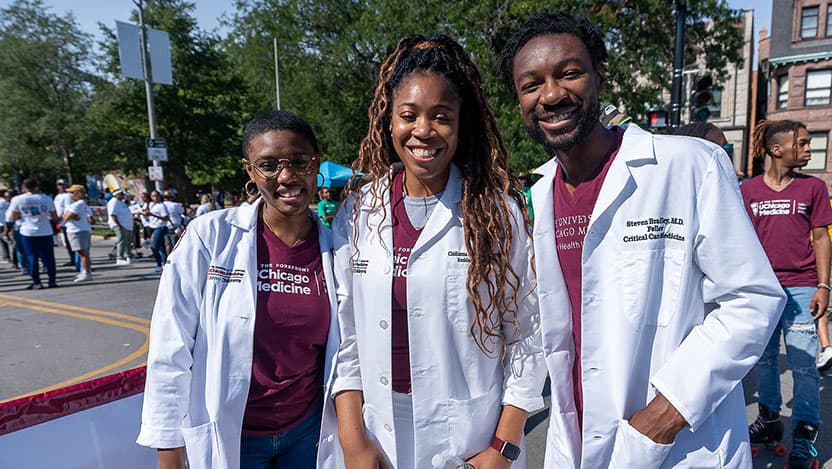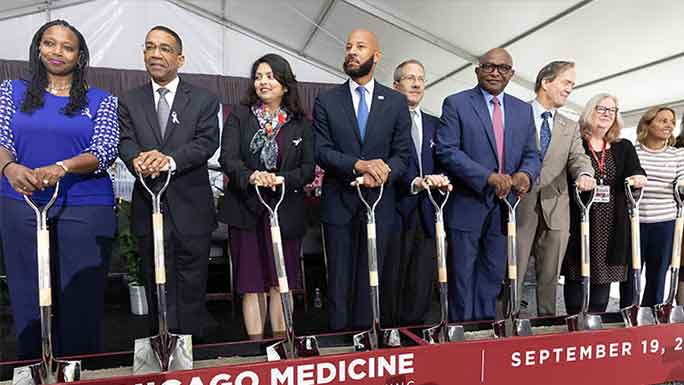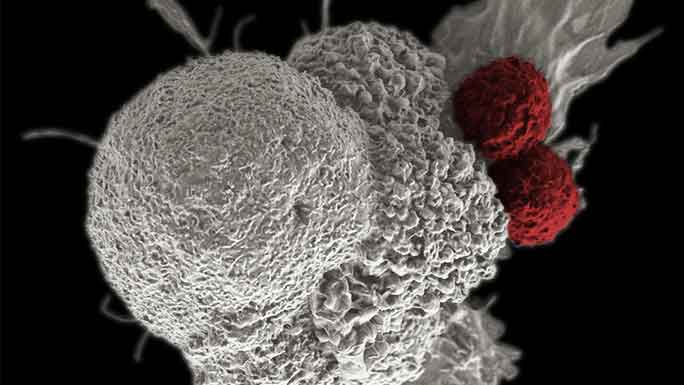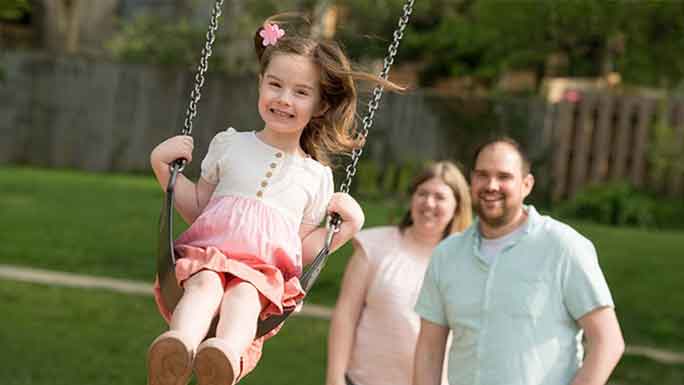UChicago Medicine & Biological Science's top 10 stories of 2023

As part of its commitment to advance health equity, the University of Chicago Medicine invested $686.2 million in benefits and services to the community in fiscal 2022, an increase of 13.1% over fiscal 2021.
This past year was chock-full of stories about research, announcements and successes at the University of Chicago Medicine & Biological Sciences. Here's a look back at 10 impactful stories that resonated with social media followers as well as readers of The Forefront blog. The list is broken down into five categories: news, growth, research, expert insights and advice, and patient stories.
News
The organization made headlines this past year for a variety of announcements, including giving back to the community and boosting medical tuition support.
UChicago Medicine invests $686M in the community
Every year, the health system puts out a report detailing how it invests in the health of the communities it serves through outreach, grant programs, strategic partnerships and collaborations that address health equity. Our most recent annual Community Benefit Report outlined the $686.2 million in benefits and services that were provided to communities on Chicago’s South Side and in the south suburbs in fiscal 2022.
Pritzker School of Medicine increases tuition support for incoming students
In an effort to attract top applicants from a range of backgrounds and reduce student debt, the Pritzker School of Medicine announced that it will provide full-tuition scholarships to up to half of each incoming class of medical students, starting in the fall of 2023. The increased financial support and a new curriculum will help Pritzker to further its goal of inspiring a diverse generation of leaders and innovators — including those who choose to teach or work in underserved communities.
Growth

Expansion of the UChicago Medicine health system continued in 2023, with the start of construction of a major building project and a new joint venture.
Cancer care and research pavilion groundbreaking
One of the most impactful announcements of 2023 happened when we broke ground to build a 575,000-square-foot, seven-story facility — the state’s first and only standalone structure dedicated to cancer care and research. The freestanding pavilion builds off the University of Chicago’s and UChicago Medicine's decades of work and leadership in cancer research and its prestigious designation as a Comprehensive Cancer Center.
UChicago Medicine AdventHealth joint venture
Back in January, we announced a joint venture with AdventHealth called UChicago Medicine AdventHealth, which combines the expertise and resources of both organizations to bring academic medicine to the western suburbs of Chicago. Under the joint venture, UChicago Medicine acquired a controlling interest in AdventHealth’s Great Lakes Region, which includes its four Illinois hospitals in Bolingbrook, Glendale Heights, Hinsdale and La Grange, along with a network of nearly 50 physicians’ offices and outpatient locations.
Research

Researchers in the University of Chicago's Biological Sciences Division (BSD) make endless discoveries and breakthroughs in science and medicine. We're honored to offer an inside look at the innovative work being done in labs across campus.
Study finds nutrient in beef and dairy improves immune response to cancer
One exciting piece of recent research showed that trans-vaccenic acid (TVA), a long-chain fatty acid found in meat and dairy products from grazing animals such as cows and sheep, improves the ability of CD8+ T cells to infiltrate tumors and kill cancer cells in mice. The research also showed that patients with higher levels of TVA circulating in the blood responded better to immunotherapy, suggesting that it could have potential as a nutritional supplement to complement clinical treatments for cancer.
Read more: Nutrient found in beef and dairy improves immune response to cancer
Research shows MDMA increases feelings of connection during conversation, showing promise for therapy
Another compelling piece of research this year looked closely at the pharmacological effects of MDMA (commonly known as ecstasy) and how it influences social interactions. The study showed that both MDMA and methamphetamine deepened personal connections after study participants had guided conversations, which suggested different mechanisms for how these drugs produce feelings of closeness.
Read more: MDMA increases feelings of connection during conversation, showing promise for therapy
Expert Insights and Advice

While our caregivers are deeply committed to providing excellent service at the bedside, they're also dedicated to helping educate and inform our patients on the things that matter to them most. This year, we published dozens of guides, Q&As and other articles addressing the questions our patients most frequently search online and ask our experts.
Q&A about menopause and weight gain
Our most viewed story of the year covers two important topics: menopause and weight gain. More than 2 million women in the United States reach menopause every year, and many report experiencing weight gain and other symptoms that can interfere with their daily lives. This expert Q&A with UChicago Medicine gynecologist Monica Christmas, MD, director of the health system's menopause program and the Center for Women’s Integrated Health, delves into the causes and treatments for menopause-related weight gain.
Read more: Why am I gaining weight so fast during menopause? And will hormone therapy help?
Colonoscopy prep tips
Nearly 15 million people in the United States get a colonoscopy each year, which helps explain the popularity of our next most-viewed article. UChicago Medicine gastroenterologist Benjamin H. Levy III, MD, shares the latest and best tips on how to make preparing for colonoscopies go as smoothly as possible.
Read more: How to make your colonoscopy prep easier
Patient Stories

We enjoy sharing stories detailing the hard work and dedication of our physicians and other caretakers. Equally as impressive and engaging is the tireless determination of patients and their loved ones to overcome life-threatening and life-altering diseases or conditions.
LaVerne Bartee becomes living donor for husband
One such story that captivated audiences was that of LaVerne Bartee, a Tinley Park woman who became the living donor of a kidney to her husband, Kevin. Their concurrent surgeries happened at UChicago Medicine, where the kidney spent a total of only about an hour outside of either person's body.
Read more: Tinley Park woman becomes living donor for husband needing kidney transplant
Preschooler overcomes acute lymphoblastic leukemia
Another patient who stole the hearts of our readers this year was a preschooler named Joy. After a long and difficult road of being treated for acute lymphoblastic leukemia (ALL), Joy finally was able to celebrate being cancer-free. The story is a hopeful one for a multitude of reasons, but especially because it showcases favorable outcomes from the treatment of ALL. Five decades ago, the five-year survival rate for ALL was just 3%. Now, cure rates exceed 85%.
Read more: Preschooler beats acute lymphoblastic leukemia
We hope you enjoyed revisiting these stories as much as we enjoyed sharing them. For more articles about our health system, visit uchicagomedicine.org/forefront. For more research news, visit biologicalsciences.uchicago.edu/news.
